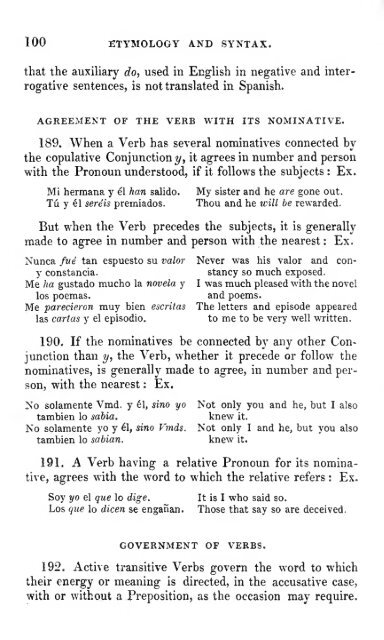A concise and simplified grammar of the Spanish language
A concise and simplified grammar of the Spanish language
A concise and simplified grammar of the Spanish language
Create successful ePaper yourself
Turn your PDF publications into a flip-book with our unique Google optimized e-Paper software.
100 ETYMOLOGY AND SYNTAX.<br />
that <strong>the</strong> auxiliary do, used in English in negative <strong>and</strong> inter-<br />
rogative sentences, is not translated in <strong>Spanish</strong>.<br />
AGREEMENT OF THE VERB WITH ITS NOMINATIVE.<br />
189. When a Verb has several nominatives connected by<br />
<strong>the</strong> copulative Conjunction e/, it agrees in number <strong>and</strong> person<br />
with <strong>the</strong> Pronoun understood, if it follows <strong>the</strong> subjects : Ex.<br />
Mi hermana y él han salido. My sister <strong>and</strong> he are gone out.<br />
Tú y él seréis premiados. Thou <strong>and</strong> he will be revvEirded.<br />
But when <strong>the</strong> Verb precedes <strong>the</strong> subjects, it is generally<br />
made to agree in number <strong>and</strong> person with <strong>the</strong> nearest : Ex.<br />
Nunca fué tan espuesto su valor Never was his valor <strong>and</strong> cony<br />
constancia. stancy so much exposed.<br />
Me ha gustado mucho la novela y I was much pleased with <strong>the</strong> novel<br />
los poemas. <strong>and</strong> poems.<br />
Me parecieron muy bien escritas The letters <strong>and</strong> episode appeared<br />
las cartas y el episodio. to me to be very well written.<br />
190. If <strong>the</strong> nominatives be connected by any o<strong>the</strong>r Con-<br />
junction than y, <strong>the</strong> Verb, whe<strong>the</strong>r it precede or follow <strong>the</strong><br />
nominatives, is generally made to agree, in number <strong>and</strong> person,<br />
with <strong>the</strong> nearest : Ex.<br />
No solamente Vmd. y él, sino yo Not only you <strong>and</strong> he, but I also<br />
también lo sabia. knew it.<br />
No solamente yo y él, sino Vmds. Not only I <strong>and</strong> he, but you also<br />
también lo sabían. knew it.<br />
191. A Verb having a relative Pronoun for its nominative,<br />
agrees with <strong>the</strong> word to which <strong>the</strong> relative refers : Ex.<br />
Soy yo el que lo dige. It is I who said so.<br />
Los que lo dicen se engañan. Those that say so are deceived.<br />
GOVERNMENT OF VERBS.<br />
192. Active transitive Verbs govern <strong>the</strong> word to which<br />
<strong>the</strong>ir energy or meaning is directed, in <strong>the</strong> accusative case,<br />
with or without a Preposition, as <strong>the</strong> occasion may require.

















